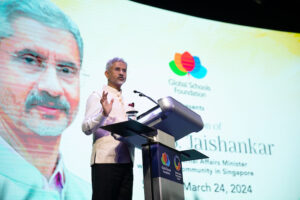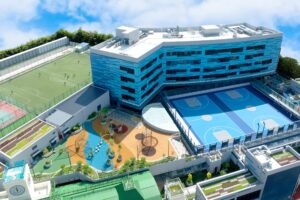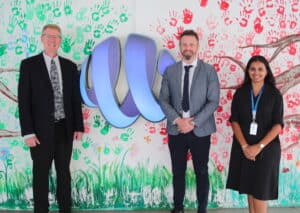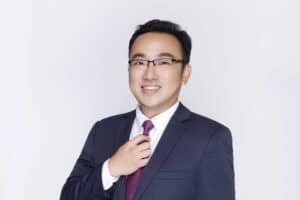In April 2022, our Head of School, Mark Renie participated in an online panel discussion organised by the South China Morning Post (SCMP). Themed ‘SCMP Conversations: Education’, the virtual panel discussion sought to inform parents in Hong Kong about the international school landscape in Singapore.
Below is an edited excerpt of the key questions asked in the webinar and Mr. Renie’s responses:
SCMP: How is Singapore dealing with opening up now with COVID?
Mr. Renie: The one thing about Singapore is that the government lays down clearly what the expectations are and what we can do with each new change in our Safe Management Measures. This particular term, we’re seeing more and more that we’re able to open. Things like canteens are now fully open. Things like masks are able to be taken off when outside. Of course, it is up to the school to decide how they want to pursue that or how they want to go forward with that. But slowly, but surely, we’re seeing more and more of a return to normal or at least a new normal with regard to schools.
We’re now able to bring parents on site. We’re now able to look at having in-person assemblies again. We’re able to have cross deployment if we have multiple campuses, for example, or have children who can interact with students from other classes and other grades on the playground and on the field. So by and large, we’re seeing a very safe and gradual, but positive approach to the opening up of Singapore with regard to education.

SCMP: How do parents at One World typically find the admission process in Singapore, compared to other countries?
Mr. Renie: I think in my experience, the parents tend to find our school’s application process quite easy. Our Admissions Team supports our parents along every step of the way. Having said that, there is a fair amount of paperwork for the family to come into the country, whether they come on an Employment Pass for the parent and Dependent Passes for the child, or the special Student Pass that allows students to enrol at an Edutrust-certified school and stay in Singapore with a guardian (the latter can only be issued by an Edutrust-certified school, such as OWIS).
Of course, the Admissions team is there to support families through that process quite comfortably and smoothly.
SCMP: How is the transfer of credits from one schooling system to another?
Mr. Renie: It’s easy to transfer after the Cambridge IGCSE to the IBDP. With lower secondary, even if it’s the IB MYP, you’re still able to transition into a non-MYP school in Singapore quite easily.
SCMP: There’s been a lot of concern in Hong Kong about students being left behind, because here there’s been a lot more home-based education. What have schools in Singapore been doing to help kids who may have fallen a bit behind with their studies because of that?
Mr. Renie: With a diverse community at OWIS and having so many students from all around the world, we do get students who may have been in lockdown for upwards of a year. I think the first step towards finding out whether that child needs support is in that admissions assessment, to see exactly how their literacy and numeracy are progressing and where they are versus where they should be for their age.And then at that point, we develop an ILP to ensure that our students have interventions that will support them to catch up with their classmates. This is really critical, and I think for parents, it’s very important that they ask that question: what is the school going to do if your child is not where they should be for their age or age expectations? So that’s one way that we make sure to support our students who may be coming from all sorts of diverse situations and diverse responses to the pandemic within the countries they’re arriving from.
SCMP: What have you tried to do to help parents or families who can’t visit in person?
Mr. Renie: During the pandemic, we’ve had to upskill our Admissions Teams on how we reach out to parents and build those bridges. I think every school in Singapore is well prepared for virtual tours. I, myself, have done a fair bit of virtual tours for parents to ensure that although they can’t visit in person, they can at least get a good view of what the school looks like, have their questions answered by not just myself, but also other members of my leadership team.
More and more now, we have parents coming on site, and we’re encouraging our parents to visit again. I think every school really wants to get back to a point where we are that community that welcomes families and encourages them to walk around and see what’s going on. And that’s a big step forward for us right now. So yes, more and more, we’re seeing parents visiting, children visiting and being able to see the school before they sign up.
SCMP: What does bilingual education look like in Singapore (this is something that is important to parents in Hong Kong)? And what does Mandarin immersion look like in Singapore in the international schools?
Mr. Renie: I think this is definitely dependent on the school that you’ll be sending your child to. For us as a two-programme IB School, a big part of the philosophy of the IB is to have our students develop the ability to communicate in a variety of different languages. So at OWIS itself, we offer Mandarin, French, Spanish and English, which is the language of instruction.
For the Mandarin immersion, each school has their own approach. For example, in OWIS’ Bilingual Programme, we’ve taken an approach where we have a bilingual teacher in the class, and the day is broken up into English parts of the day and Mandarin parts of the day to allow for the students to work between both languages. In Primary, we do the Units of Inquiry in both Mandarin and English. Maths will also be taught in both languages. And then we’d have dedicated guided reading times for English and Mandarin.
SCMP: What if you don’t speak English as your first language? How does your school help a child there? Or what advice can we give to parents who might be concerned that perhaps their child isn’t sufficiently fluent in English?

Mr. Renie: We have a very strong English as an Additional Language programme, and we assess children when they first come in. And that assessment, just to be clear, isn’t to be selective, but because we believe in inclusivity, and that’s a big part of our values. So we assess to see where a child is in their language learning, specifically their English language learning. And then, if we identify that there needs to be support, we have pull-out programmes or extraction programmes, where a child may be taken out of class for up to three or four times a week and given one-to-one or small group instruction. And they learn English in a more engaging way.
Our English as an Additional Language learners work on building their foundation – listening comprehension, reading, and writing, just so we can ensure that they can access the curriculum when they get back into the class. And I think this is critical when it comes down to the goal of this programme – it’s not to be a permanent solution. This is just a short intervention to get our students to be able to then access the curriculum in the classroom. Because without a doubt, the best way a child is going to learn is to be fully immersed in English among their peers, talking and playing and interacting in that language.
SCMP: What are the trends now for wellbeing and pastoral care in Singapore? And can we talk a little bit about how COVID has affected these trends?
Mr. Renie: I think mindfulness has emerged as being such a critical aspect of supporting pastoral care within schools. We are aligned with Mindful Sparks, an organisation that trains our teachers on how to embed mindful practices within the classroom. Our students are given the opportunity to take mindful moments. It is integrated in our timetable daily. And we talk about it. We want to talk openly about our emotions and feelings. OWIS is committed to having a kind, safe and compassionate environment, and mindfulness supports that.
We also like to get our students to start developing that growth mindset from a very young age. So we talk openly about how we can move from a fixed mindset to a growth mindset as young as three and four years old, allowing our students to start to discover the “power of yet”. If a child has drawn a house and they’re not happy with that house, we talk to them one-on-one about it: “You’re not there yet. What can you do to be there?”
Once you start to inculcate that growth mindset at a young age, as they get older and go into Primary and Secondary, students start to develop the key skills they need to be successful. They are able to say, “You know what? I haven’t mastered this particular concept yet, but here is what I need to do to get there.” And this will have a profound impact on their emotional well-being and as well as their academic progress.
So pastoral care now has to look towards mindfulness, a growth mindset, and a very open and honest and frank conversation about how we feel and what we can do to make ourselves feel better. This pandemic has brought a lot of anxiety as well. So we want our students to be able to learn how to deal with anxiety and uncertainty as we move out of this pandemic.
SCMP: Any guidance you would give parents on how to choose an international school?
Mr. Renie: In a good international school, the guiding statements should be referenced by the organisation time and time again, when making the most important decisions, the decisions that impact children. And I think by looking at a school’s guiding statements, their mission, their vision, their values, it really lets a parent know exactly what is the core foundation of that school. And I’ll always ask parents to make sure that aligns with their values. I’ll always say that not every school is for every child and not every child is for every school. I think the values and the guiding statements really allow you to understand if that school is for you and for your family.
SCMP: How full are international schools in Singapore at the moment? Is it possible to still apply for August 2022 or there is a longer waitlist?
Mr. Renie: Our school has a nationality cap. And that’s to make sure that we have a culturally diverse community. Having said that, if we’re talking specifically to our Hong Kong audience, we have room for them at our Nanyang and Suntec campuses. We also have our new campus opening in Punggol in August 2023, and we are already taking applications for that campus.
SCMP: What are the admission results of high school graduates in Singapore? What kind of universities do graduates from international schools in Singapore go to, and what countries do they tend to go to?

Mr. Renie: We’re actually very proud to announce that we’ve had students getting accepted to universities in Canada, the USA, the UK, and Europe. So some of the universities are the University of British Columbia and University of Toronto in Canada. We’ve had students get accepted to Manchester University, Newcastle University, and a few others in the UK, Rutgers and SUNY in the US, and Queensland and Monash in Australia.
The areas that our students will study further range from medicine and the sciences, to STEAM-focused programmes, finance, art and music.
SCMP: Is there a platform for parents to interact with each other?
Mr. Renie: We have our parent committee, the OWIS Parent Committee (OPC), and they are very involved in what goes on at the school. I meet with them every month, because it’s very important that I’m hearing what they’re saying, that they’re bringing their ideas to me. They’re also involved in raising funds and charity events.
We have a Facebook Page for parents, and we have WhatsApp groups, where parents are able to talk to each other. As I said before, I think the key thing for us as we move forward from this pandemic is being able to open the school again to parents, and having them come in. We really want to have that community feel, that family feel again.











